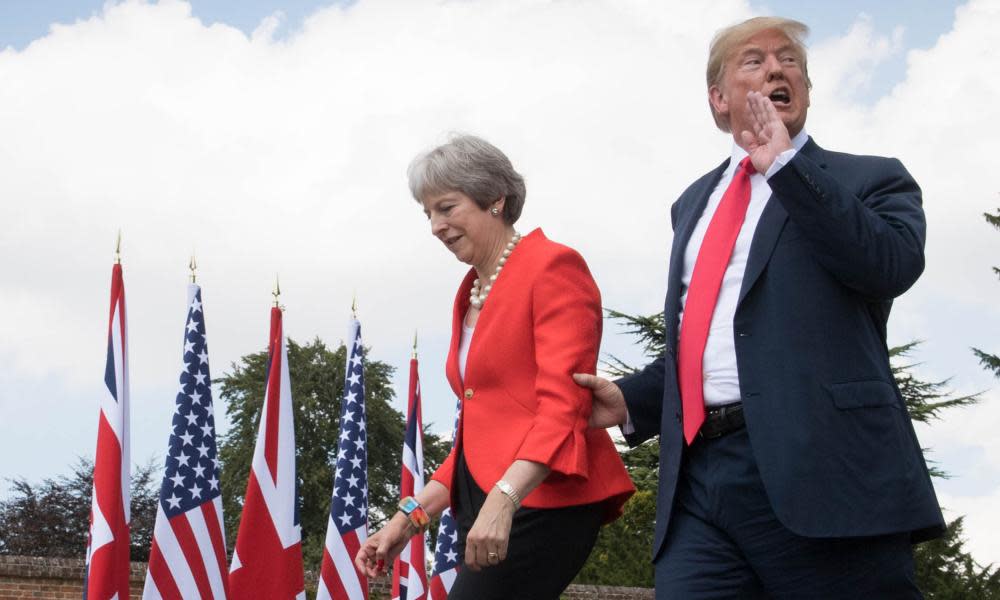Trump policies should push Britain to reduce its ties to US, say peers

Britain must downgrade its “bedrock” reliance on the US and recognise that the Trump administration is seeking to undermine British efforts to tackle the most critical challenges facing the world, a committee of peers has said.
The Lords international relations committee said the Trump administration’s actions on issues including the Paris climate change deal, the Iran nuclear accord and steel tariffs had been “contrary to the interests of the UK”.
After taking evidence over the past year from some of the country’s most senior diplomats, national security experts and foreign policy specialists, the committee says the UK needs to develop alliances elsewhere around the globe, including within Europe, to maintain reformed multilateral institutions. If it does not it will risk a form of “global anarchy” gripping the world in fields such as trade, in turn “leading to worse things – as was the hideous story of the 1930s”.
The committee, which is chaired by the former Conservative cabinet minister Lord Howell and includes the former Foreign Office diplomat Lord Hannay, challenged a claim by the foreign secretary, Jeremy Hunt, that Trump was “seeking to reform, rather than disrupt and destroy the United Nations”. The committee said it took a more sceptical view and urged the government to “continue to resist US challenges to the UN”.
Overall, the report is likely to play into existing debates, mainly in France and Germany, on whether Trump’s “America first” policy is intended to wreck multilateral institutions including the EU on the basis that he treats them as a rival to US primacy.
The report says: “The US administration has taken a number of high-profile unilateral foreign policy decisions that are contrary to the interests of the United Kingdom. US withdrawal from the Paris agreement on climate change, the Iran nuclear deal and the UN human rights council, and the imposition of trade tariffs on its allies, undermine efforts to tackle pressing global challenges of critical importance to the UK.
“The UK has struggled to influence the administration, which is, in part, a reflection of a broader shift in the US towards a more inward-looking ‘America first’ stance, with less focus on the transatlantic alliance or multilateralism. In future, the government will need to place less reliance on reaching a common US-UK approach to the main issues of the day than has often been the case in the past”.
The report describes US foreign policy as deliberately chaotic. “The difficulty the UK and its allies have faced in trying to influence the US demonstrates the challenge of working with the administration,” it says.
It concludes: “How damaging this will be to what has hitherto been the UK’s most important international relationship will depend on whether the current approach is an enduring trend. Should President Trump win a second term or a similar administration succeed him, the damage to UK–US relations will be longer lasting”.
In common with recent German foreign policy thinking, the report suggests it may be sensible for the UK to reach out beyond the White House “to those parts of American society which share our views and values”.
It also says that either way the UK will need its European partners more than ever. “In the context of a strained transatlantic relationship, an increasingly assertive China, a disruptive Russia and broad shifts to the global balance of power, it remains firmly in the UK’s national interest to maintain the strongest possible partnership on foreign and security policy with its likeminded European partners, both bilaterally and at an EU level, after Brexit.”
The committee says the UK must make the defence of a liberal world order and international institutions the centre of its foreign policy, and that given the Trump administration’s hostility to multilateralism, it will “need to work with like-minded nations to move ahead on some global issues without US participation or support, or a changed nature of engagement”.
The committee says a US administration official told it that the president had promised disruption and that he was delivering. The shadow foreign secretary, Emily Thornberry, told the peers that the UK had in the past “come to rely on the United States as being reliable, predictable and understandable. We now have a president whose very schtick is being unreliable”. She said this had “a profoundly destabilising effect”.
The former UK ambassador to Washington Sir Peter Westmacott claimed the US was going through the machinery of international institutions such as the UN largely to disrupt. He pointed to the examples of the former US ambassador to the UN Nikki Hayley having “more or less said ‘We know where you live’ to those who dared to vote in a way she did not want” at the security council.
The report says UK foreign policy is not being challenged solely by Trump and Brexit, but by deeper forces including disruptive technology, the rise of China and a shift of power away from governments to non-state actors.

 Yahoo News
Yahoo News 
